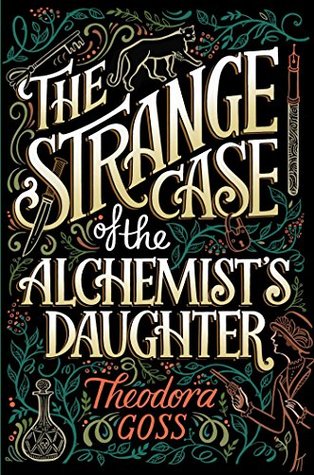Have you ever wondered what would happen if an author tried to create a feminist mix of Sherlock Holmes, Jack the Ripper, Frankenstein, Jeckyll and Hyde, Rappuccini's Daughter, the Island of Doctor Moreau, Dracula, and just a smidgen of Dante and Beatrice? Well, wonder no more! Goss has made a metafictional monster mash-up of chaste YA with mostly older characters who interrupt the narrative to make comments (rather reminiscent of Alisdair Gray's Lanark).
In spite of how messy it sounds and how 2-dimensional the characters are, it's actually quite a good tale. Goss has great plotting and pacing skills, and she does not indulge in a frequent habit of authors: writing in unnecessary running around just to show off how much research was done.
Also, although this is clearly the start up book for a whole series, it does have a decent ending with a fair amount of resolution. I liked it well enough that I will probably read the sequel when it comes out.
The book is reasonably well-edited, although the author (and her copy editor) has a problem with the use of "who" and "whom" in three separate occasions.
There is a bit of a dilemma as to who the intended audience is. The book is very nearly sex-free, with mentions of birth control, prostitutes, and one character's former "relations" with a man, but the characters are much older (with 2 exceptions) than usual for YA. That could be overlooked, but the author assumes the reader has a good familiarity with Conan Doyle, Shelley, Stevenson, Hawthorne, Wells, Stoker, Dante, and, of course, the factual parts of the Whitechapel Murders. I've taught school for decades, and I can assure you that very few teens are that well-read. In fact, most adults aren't that well-read. So, then, is Goss' intended audience YA-loving women? If so, why does the book so carefully tip-toe around sex? (The main character, Mary, is vaguely crushing on both Holmes and Watson, as if she were ten, for she appears to have no hormones at all.)
Overall, however, it's a action-packed tale and not a bad read, even if the author rather buried herself by trying to work in too many threads.
UPDATE: When I posted this review on Amazon, I could not help but notice that I was right in guessing that many readers would not grasp the literary references and allusions. One "reviewer" complained that the title was "stupid," clearly not even grasping the fact that it's from Stevenson's book on which the main character is based. Another reviewer couldn't tell the difference between classic literature and a "penny dreadful." I rolled my eyes so hard it hurt.

No comments:
Post a Comment